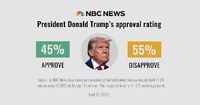As President Donald Trump approaches the 100-day mark of his second term, he is facing unprecedented challenges, reflected in a series of recent polls that show a significant decline in his approval ratings. According to a new ABC News/Washington Post/Ipsos poll, Trump's job approval rating stands at a dismal 39%, marking the lowest for any president in the past 80 years at this stage. This figure is down six percentage points from February and represents a stark contrast to the 45% approval he enjoyed at the beginning of his term.
Moreover, a separate NBC News poll indicates that 55% of American adults disapprove of Trump's handling of his presidency, while only 45% express approval. The intensity of disapproval is notable, with over 40% of respondents stating they strongly disapprove of Trump's performance, compared to just 25% who strongly approve. These figures suggest that the president's base is not only shrinking but also increasingly dissatisfied.
Concerns about Trump's economic policies loom large in the public's mind. A staggering 72% of respondents believe that his economic strategies could lead to a recession in the near future. Additionally, 73% view the economy as being in poor shape, and 53% feel that their personal financial situation has worsened since Trump took office. The president's promise to curb rising prices has also fallen flat, with 62% of Americans reporting that prices are increasing. Notably, 71% of respondents see his tariffs as a contributing factor to inflation.
Despite these alarming trends, Trump still manages to maintain a degree of trust among voters when it comes to addressing the nation's problems. In fact, 37% of respondents trust him more than Congressional Democrats, who garnered just 30% in the same survey. This indicates a complex dynamic: while many express dissatisfaction with Trump's policies, they remain skeptical of the alternatives presented by the opposition party.
On the issue of immigration, traditionally seen as a strong point for Trump, public opinion is divided. The NBC News poll shows that 49% of Americans approve of his handling of border security, while 51% disapprove. This split reflects a broader sentiment of uncertainty surrounding Trump's approach to immigration, particularly as reports of wrongful deportations and legal challenges to his policies have surfaced.
In addition to economic and immigration issues, Trump's foreign policy has also come under scrutiny. Approximately 60% of voters disapprove of his handling of foreign affairs, which includes a controversial tariff policy that has drawn criticism both domestically and internationally. The president's actions have led to a perception that he is alienating traditional allies while emboldening adversaries.
Experts warn that Trump's aggressive foreign policy stance, which includes a departure from established norms regarding NATO and relations with Russia, could have long-lasting implications. For example, his recent comments about annexing Greenland and making Canada the 51st state have raised eyebrows and concerns about the future of U.S. relationships with its allies.
Furthermore, Trump's administration has faced accusations of overreach and a disregard for the rule of law. A significant portion of the public—62%—believes that his administration is trying to avoid complying with federal court orders, and 64% feel he is overstepping his presidential authority. This perception has been bolstered by various legal challenges to his policies, particularly those involving immigration and federal funding cuts.
Despite the growing opposition, Trump's core support remains relatively intact. Among those who voted for him in the last election, only 6% express regret about their choice, indicating that his base is still largely committed. However, the erosion of support among key demographics, such as non-college-educated white men, who now show a 54% approval rating for Trump—tied with his lowest in this group—signals a troubling trend for the president.
Trump's approval ratings are further complicated by the partisan divide evident in the polls. While 83% of Republicans approve of his performance, a striking 93% of Democrats disapprove. Among independents, the disapproval rate is even higher, with 68% expressing dissatisfaction with Trump's presidency. This division underscores the challenges Trump faces as he attempts to navigate a politically polarized landscape.
Looking ahead, the results of these polls suggest that Trump must address the growing concerns of the electorate if he hopes to maintain support. The public's skepticism about his economic policies, combined with concerns about his handling of immigration and foreign relations, creates a precarious situation as he moves forward in his term. The upcoming midterm elections will likely serve as a crucial test of Trump's ability to rally his base and regain the trust of independent voters.
In summary, as President Trump nears the end of his first 100 days in office, he is confronted with a multitude of challenges that threaten his presidency. From declining approval ratings to widespread discontent over his policies, the path ahead appears fraught with obstacles. Whether he can pivot and address these issues remains to be seen, but the clock is ticking as he seeks to solidify his agenda and maintain the support of the American people.




